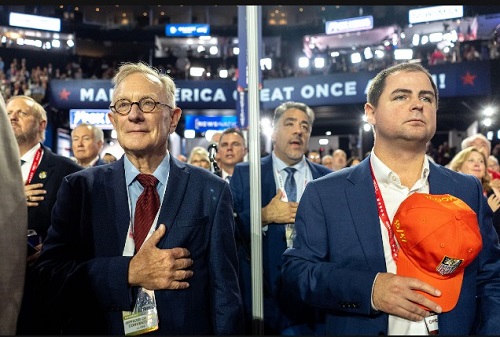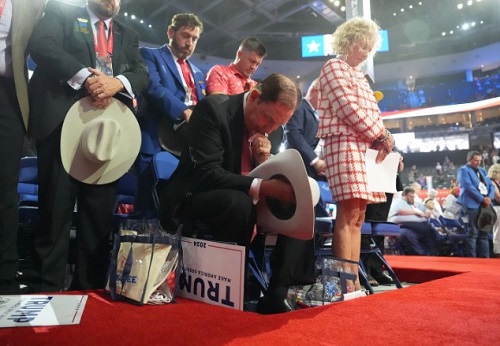 Shawn Steel, 77, a sergeant-at-arms at the Republican National Convention, reflects on his 60 years of attending GOP conventions, from Goldwater to Trump.
Shawn Steel, 77, a sergeant-at-arms at the Republican National Convention, reflects on his 60 years of attending GOP conventions, from Goldwater to Trump.
By
David Maraniss MILWAUKEE — The convention history of Shawn Steel began exactly 60 years ago this week when he hitched a ride from Van Nuys in California’s San Fernando Valley to San Francisco, borrowed credentials from a friend, and found a seat in the rafters of the Cow Palace to cheer on the presidential nomination of his ideological idol, Republican Sen. Barry Goldwater of Arizona.
Steel’s role in the Republican Party has changed considerably since then, even if his political perspective has not. This week, at age 77, the California delegate and former state GOP chair is roaming the aisles of Milwaukee’s Fiserv Forum with an all-access pass as the 2024 convention’s sergeant-at-arms, a good-natured disciplinarian looking for wayward delegates who might be disturbing the peace by standing on their chairs or sporting off-color T-shirts that would present a bad image on television.
Steel’s role in the Republican Party has changed considerably since then, even if his political perspective has not. This week, at age 77, the California delegate and former state GOP chair is roaming the aisles of Milwaukee’s Fiserv Forum with an all-access pass as the 2024 convention’s sergeant-at-arms, a good-natured disciplinarian looking for wayward delegates who might be disturbing the peace by standing on their chairs or sporting off-color T-shirts that would present a bad image on television.
Back in 1964, Steel was a 17-year-old high school kid and just the kind of convention attendee he is now on the prowl for. While walking with the crowd toward the Cow Palace that long-ago July, he recalled, he picked the back pocket of a New York Times reporter whose identification papers were dangling temptingly in front of him. After a companion with credentials passed them back to Steel, he clambered up to the cheap seats and settled near a raucous posse of alternate delegates from Texas who were exchanging the call and response “Viva!” — “Ole!” with their Lone Star delegate compatriots down on the convention floor.
The memory that burns brightest in Steel’s mind six decades later is not Goldwater’s “Extremism in the defense of liberty is no vice” acceptance speech, but rather the moment when Nelson Rockefeller, the liberal Republican governor of New York, strode to the podium to repudiate Goldwater and the burgeoning conservative movement. As soon as the young Steel caught sight of Rocky, he sprang to his feet and booed at the top of his lungs. By his account, like an old veteran recounting war stories, he was the “first one up and the first one booing,” triggering an incessant cacophony of noises — cowbells ringing, drums banging, jeers bellowing — that drowned out the plea for tolerance from the patrician Easterner, whose five-minute speech was interrupted 22 times.
Although security is even more intense this week following the attempted assassination of Donald Trump, Steel does not expect similar dust-ups inside the convention hall. There had been a few loud quarrels to deal with the first time he held the sergeant-at-arms post, in Cleveland in 2016, when Trump supporters clashed vociferously with a renegade band of Ted Cruz backers, but the senator from Texas has long since fallen in line behind Trump, and other potential anti-Trumpers have either followed suit or stayed away. Now, Steel expects the atmosphere to be euphoric whenever Trump enters the building, as it was Monday night for his first public appearance since the assassination attempt, culminating Thursday night when Trump formally accepts the presidential nomination with what Steel predicted might be “the most-watched convention speech in history.”
Steel was first drawn to politics as a teenager by the speeches of Fred Schwarz, an Australian doctor who came to California preaching the gospel of his Christian Anti-Communism Crusade. While Steel considered himself more anti-communist than Christian, he identified with Schwarz and his supporters, including John Wayne, Roy Rogers and Ronald Reagan, who emerged as his second north star after Goldwater. By the time he reached the Cow Palace, he had devoured Goldwater’s “Conscience of a Conservative,” one of many anti-communist works recommended to him by the owners of a freedom bookstore in Van Nuys.
 Nebraska delegates pray on the first day of the Republican National Convention. (Jabin Botsford/The Washington Post)
Nebraska delegates pray on the first day of the Republican National Convention. (Jabin Botsford/The Washington Post) In the midst of the seven years he spent as an undergraduate at California State University at Northridge, Steel devoted himself to organizing Young Americans for Freedom (YAF) chapters in Southern California and “dealing with the Commies on campus.” He attended his second Republican convention in Miami in 1968, “raising hell” against Rockefeller one last time, pushing a modest presidential boomlet for Reagan, but having no interest in the nominee, Richard M. Nixon. He thought the fellow Californian he dismissed as “Tricky Dicky” was too much of a big government proponent and had “no moral center.”
Human beings are inevitably more complicated and contradictory than the political labels that so often define them, as Steel’s odyssey through the 1960s into the 1970s revealed. His opposition to the military draft and doubts about the war in Vietnam eventually led to him being “purged” by his pals in the YAF. His disdain for leftists was matched only by his love for rock-and-roll. Even today, Steel carries on his cellphone photos of various rock concerts he attended: Jimi Hendrix, Jim Morrison, the Doors, Led Zeppelin, Bob Dylan and the Who (“Play ‘Magic Bus’!” he screamed as the band instead performed a song from its rock opera “Tommy”). He was such a Deadhead that when a date seemed ungrateful about the music, he offered her the keys to his car to leave the venue. To Steel, an all-access pass to a political convention pales in comparison with a backstage pass at a concert. When he gets back to California later this month, he has tickets to see Willie Nelson and Dylan, whom he considers a poetic genius.
Steel’s rise in the Republican Party over the decades coincided with that of his wife, Rep. Michelle Steel, the Korean American he married in 1981, who went from a post on the California State Board of Equalization to Congress representing a suburban Los Angeles-area district known for populations speaking at least seven languages — English, Korean, Chinese, Hindi, Spanish, Vietnamese and Tagalog. Shawn, a lawyer who made his reputation suing insurance companies, moved up the party power chain step-by-step, raising money for candidates through the years until he became a delegate for the 1996 convention in San Diego, was elected state party chair in 2001, was elected as California’s national committeeman in 2008 and was named convention sergeant-at-arms eight years ago.
Being a delegate from California is a mixed blessing. Because of the delegation’s size — 169 strong — and blue-state irrelevance in the November general election, the Californians get placed in hotels far from the action. Rooms in suburban Brookfield, Wis., this year represent an upgrade from the past. For the Minneapolis convention in 2008, Steel had to make the trek from a motel in Wisconsin, and in 2012 he complained that he and his fellow Californians were housed on a Florida island “closer to Cuba than Tampa.”
Like many Republicans, Steel was against Trump before he was for him, expressing doubts during the 2016 primaries on whether the New York real estate tycoon was a true conservative or a poseur. But he came around, and Trump fully won him over as president with his nominees for the Supreme Court and federal judiciary. Steel was pleased by the overturning of Roe v. Wade but even more by many court decisions supporting business and diminishing the powers of the federal government. To him, it is as though American politics have circled back to that July six decades ago when Steel sat in the rafters at the Cow Palace.
Steel shares the prevailing mood among delegates in Milwaukee that Trump’s prospects to regain the presidency were strong before but only grew in the aftermath of Saturday’s assassination attempt, buoyed by the glorifying photographic imagery that “was like too much perfection.” But then again, Steel was so convinced that Trump would lose in 2016 that he stayed home on election night, preferring that to standing around with what he thought would be a gloomy crowd of dour-faced Republicans. “That’s one reason I love politics,” he said. “It’s completely unpredictable.”